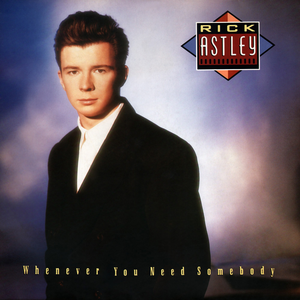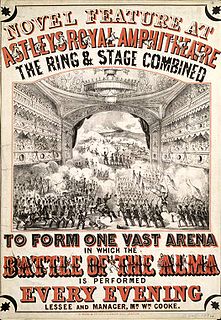See also
- Philip Astley, founder of eponymous circus and theatre
Astley's Amphitheatre may refer to:

A circus is a company of performers who put on diverse entertainment shows that may include clowns, acrobats, trained animals, trapeze acts, musicians, dancers, hoopers, tightrope walkers, jugglers, magicians, ventriloquists, and unicyclists as well as other object manipulation and stunt-oriented artists. The term circus also describes the performance which has followed various formats through its 250-year modern history. Although not the inventor of the medium, Philip Astley is credited as the father of the modern circus. In 1768, Astley, a skilled equestrian, began performing exhibitions of trick horse riding in an open field called Ha'Penny Hatch on the south side of the Thames River. In 1770, he hired acrobats, tightrope walkers, jugglers and a clown to fill in the pauses between the equestrian demonstrations and thus chanced on the format which was later named a "circus". Performances developed significantly over the next fifty years, with large-scale theatrical battle reenactments becoming a significant feature. The traditional format, in which a ringmaster introduces a variety of choreographed acts set to music, developed in the latter part of the 19th century and remained the dominant format until the 1970s.

Philip Astley was an English equestrian, circus owner, and inventor, regarded as being the "father of the modern circus". Modern circus, as an integrated entertainment experience that includes music, domesticated animals, acrobats, and clowns, traces its heritage to Astley's Amphitheatre, a riding school that Astley founded in London following the success of trick-riding displays given by him and his wife Patty Jones in 1768. Astley's first competitor was equestrian Charles Hughes, who had previously worked with Astley. Together with Charles Dibdin, a famous author of pantomimes, Hughes opened a rival amphitheatre in London, which Dibdin called the Royal Circus and Equestrian Philharmonic Academy.

Richard Paul Astley is an English singer, songwriter and radio personality, who has been active in music for several decades. He gained worldwide fame in the 1980s, having multiple hits including his signature song "Never Gonna Give You Up", "Together Forever" and "Whenever You Need Somebody", and returned to music full-time in the 2000s. Outside his music career, Astley has occasionally worked as a radio DJ and a podcaster.
Who Are You is the eighth studio album by English rock band the Who, released on 18 August 1978 by Polydor Records in the United Kingdom and MCA Records in the United States. Although the album received mixed reviews from critics, it was a commercial success, peaking at number 2 on the US charts and number 6 on the UK charts.
Astley may refer to:

Universal Amphitheatre was an indoor amphitheatre located in Los Angeles, California within Universal City. It was originally built as an outdoor venue, opening in the summer of 1972 with a production of Jesus Christ Superstar. It was remodeled and converted into an indoor theatre in 1982 to improve acoustics. The amphitheater closed on September 6, 2013 and was demolished for The Wizarding World of Harry Potter attraction at Universal Studios Hollywood.

"When I Fall in Love" is a popular song, written by Victor Young (music) and Edward Heyman (lyrics). It was introduced in the film One Minute to Zero. Jeri Southern sang on the first recording released in April 1952 with the song's composer, Victor Young, handling the arranging and conducting duties. The song has become a standard, with many artists recording it; the first hit version was sung by Doris Day released in July 1952.
John Sanger was an English circus proprietor.

The Cirque Olympique in Paris, also known as the Cirque Franconi, was an equestrian theatre company, founded in 1782 by Philip Astley, the English inventor of the modern circus ring, and was initially known as the Cirque d'Astley or the Cirque Anglais.

"Never Gonna Give You Up" is the debut single recorded by English singer and songwriter Rick Astley, released on 27 July 1987. It was written and produced by Stock Aitken Waterman, and was released as the first single from Astley's debut album, Whenever You Need Somebody (1987). The song was a worldwide number-one hit, initially in the United Kingdom in 1987, where it stayed at the top of the chart for five weeks and was the best-selling single of that year. It eventually topped the charts in 25 countries, including the United States and West Germany. The song won Best British Single at the 1988 Brit Awards.

Astley's Amphitheatre was a performance venue in London opened by Philip Astley in 1773, considered the first modern circus ring. It was burned and rebuilt several times, and went through many owners and managers. Despite no trace of the theatre remaining today, a memorial plaque was unveiled in 1951 at its site at 225 Westminster Bridge Road.

Andrew Ducrow (1793–1842) was a British circus performer, often called "Colossus of equestrians". He was the originator of horsemanship acts and proprietor of Astley's Amphitheatre and remains one of the few giants of equestrian drama whose name is still familiar in the twenty-first century.

Whenever You Need Somebody is the debut studio album by English singer Rick Astley, released on 16 November 1987 by RCA Records. It is his best-selling album and, according to his own official website, has sold 15.2 million copies worldwide. The album is listed as the 136th best-selling album in Spain, and was the seventh best-selling album of 1987 in the United Kingdom.

Rickrolling, alternatively Rick-rolling or Rickroll, is a prank and an Internet meme involving an unexpected appearance of the music video for the 1987 song "Never Gonna Give You Up," performed by the English singer Rick Astley. The meme is a type of bait and switch using a disguised hyperlink that leads to the music video. When victims click on a seemingly unrelated link, the site with the music video loads instead of what was expected, and they have been "Rickrolled". The meme has also extended to using the song's lyrics, or singing it, in unexpected contexts. Astley himself has also been Rickrolled several times.

The discography of English singer and songwriter Rick Astley consists of nine studio albums, five compilation albums, two remix albums, and twenty-four singles.

Hippodrama, horse drama, or equestrian drama is a genre of theatrical show blending circus horsemanship display with popular melodrama theatre.

William Batty (1801–1868) was an equestrian performer, circus proprietor, and longtime operator of Astley's Amphitheatre in London. Batty was one of the most successful circus proprietors in Victorian England and helped launch the careers of a number of leading Victorian circus personalities, such as Pablo Fanque, the versatile performer and later circus proprietor, and W.F. Wallett, one of the most celebrated clowns of the era. Also, while in operation for only two years, Batty's most lasting legacy is probably Batty's Grand National Hippodrome, also known as Batty's Hippodrome, an open-air amphitheatre he erected in 1851 in Kensington Gardens, London, to attract audiences from the Crystal Palace Exhibition nearby.
Astley's Amphitheatre was a theatre on Peter Street, Dublin, which operated from 1789 to 1812. Established by Philip Astley, it was Ireland's first circus and, in later years, was known as the Royal Hibernian Theatre.
Richard Usher was an English clown and theatre designer. He performed for many years at Astley's Amphitheatre.